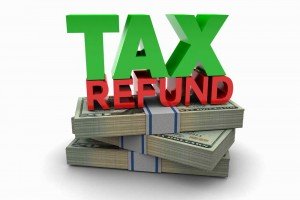It’s tax season, and if you are like most of my clients, that means a tax refund is just around the corner.  Naturally, you want to keep your tax refund, most likely to cover to some necessary expenses that had to wait until the money arrived.
Naturally, you want to keep your tax refund, most likely to cover to some necessary expenses that had to wait until the money arrived.
Here are some points to consider before you spend any of your tax refund.
Chapter 7 Cases
Keeping a tax refund in a Chapter 7 case focuses on the issue of bankruptcy exemptions. There are two types of exemptions available to Texas residents in a bankruptcy case: Texas state exemptions and federal bankruptcy exemptions.
Under Texas exemptions, there is no protection for cash or a cash-equivalent, like a tax refund. So, if I have a client that needs to use Texas exemptions, then we figure out ways that the client can legitimately use the tax refund money before filing the bankruptcy case. Under federal bankruptcy exemptions, there may be a wild card exemption that can be used to protect some cash. If I have a client that can entirely protect the tax refund with the wild card exemption, then we can file the Chapter 7 case and know that the tax refund is safe. If I have a client that needs to use federal exemptions and we don’t have any/enough wild card exemption to protect the tax refund (and the amount of the refund is large), then we figure out ways that the client can legitimately use the tax refund money before filing the bankruptcy case.
Chapter 13 Cases
When determining whether you can keep your tax refund in a Chapter 13 case we look at the issue of exemptions, like we do in a Chapter 7 bankruptcy. We also look at the issue of disposable income, which is generally the amount of income that is left over after you subtract your living expenses and debts you want/have to keep. The tax refund is simply a one-time increase in disposable income.
Keeping a tax refund is different in a Chapter 13 bankruptcy, and this issue is handled differently in other jurisdictions. As a result, you want to get some location-specific advice from a bankruptcy attorney that works in the jurisdiction where you reside.
If you want to know how the issue of tax refunds are handled in a Chapter 13 case filed in the San Antonio Division of the US Bankruptcy Court for the Western District of Texas, then keep reading.
The courts in the San Antonio Division have ruled that, if you want to keep any part of your tax refund, you need to show that you need the tax refund money to cover reasonable and necessary expenses that are not already provided for in your budget. We do that by advising clients to prepare an itemized list of things that you need the tax refund money to cover, such as a home repair, car repair, medical or dental procedure. In addition to the itemized list, the client must get some estimates or bills to substantiate the amounts on the list.
The courts in the San Antonio Division have also ruled that you can amortize the refund in your budget by adding 1/12th of the tax refund to your monthly budget. If you usually get a tax refund of $3,000, then we can put “1/12th of estimated tax refund” in your budget as “other income” in the amount of $250. This assumes that this additional $250/month doesn’t make your expenses unreasonable. If your Chapter 13 plan is confirmed by the court with this provision in your budget and your plan, then you can keep $3,000 of your tax refund without having to go through the process of preparing an itemized list of things that you need the tax refund money to cover.
If your Chapter 13 plan is paying 100% to your unsecured creditors, like credit cards, then the requirement to turnover tax refunds will not apply to you. The reason for turning over the tax refund is to provide more of a return to your unsecured creditors. So, if they are going to be fully paid by your monthly plan payment, then there is no reason to apply the tax refund money to the plan. If your plan is already paying 100% to unsecured creditors and you sent your tax refund to the Chapter 13 trustee, then your plan would simply finish faster rather than pay your unsecured creditors more than they are owed. I don’t recommend paying the Chapter 13 plan any faster, simply because you may need those extra funds as an emergency reserve. As Dave Ramsey says, unexpected events are certain to occur.




